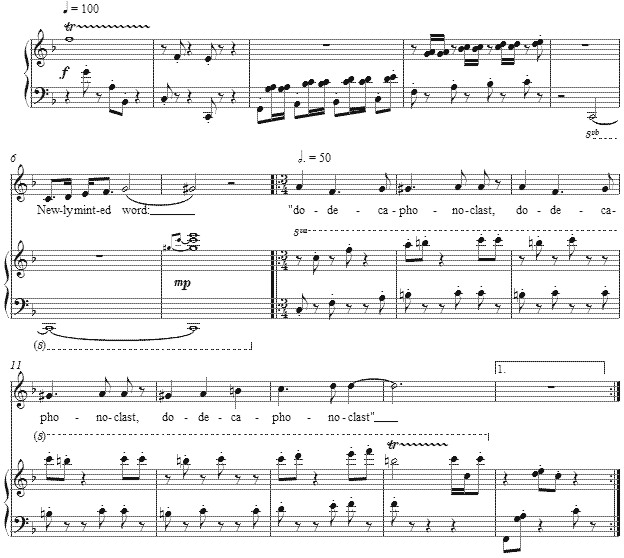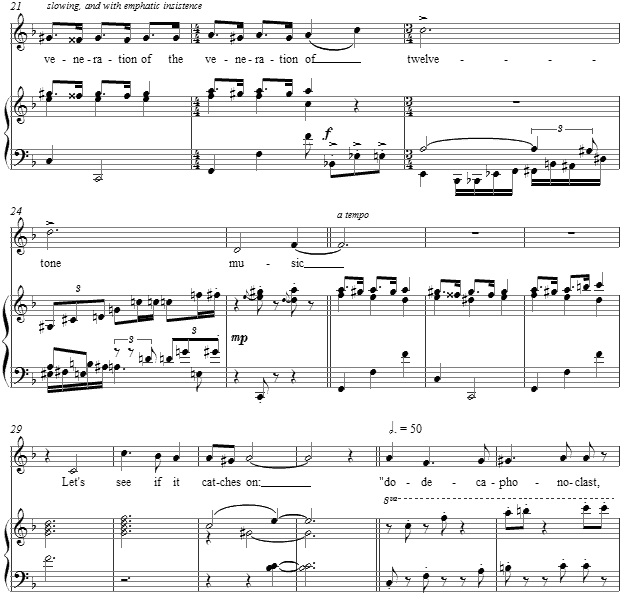Music and Texts of GARY BACHLUND
Vocal Music | Piano | Organ | Chamber Music | Orchestral | Articles and Commentary | Poems and Stories | Miscellany | FAQs
dodecophonoclast - (2009)
Elaine Fine
for medium high voice and piano
Newly-minted word:
"dodecophonoclast,"
a person who opposes
the veneration of twelve tone music.
Let's see if it catches on:
"dodecophonoclast!"Copyright © 2009 Elaine Fine Used with permission
[ 2 pages, circa 1' 10" ]
Elaine Fine
As I read musical blogs with some regularity [ 1 ], I happened upon Elaine Fine's "newly minted" word, a short comment on those who would "oppose" the veneration of twelve-tone music. Her resume may be seen there. The URL is: http://musicalassumptions.blogspot.com.
The technique and aesthetic posture of dodecaphonic music is a historical truth of the twentieth century, but some of its most ardent adherents have been guilty of making it quite a "veneration." In fact, during my early education there were times when the requirement of composing in a contemporary style was more a dictate than a choice, such that I found myself studying set theory and arranging for prepared piano before studying Fux and Schenker. The proverbial cart before the musical horse. In fact, the dictate to compose with twentieth century styles, one professor rudely argued that Puccini's Turandot and Strauß' Four Last Songs, Vaughan Williams' equally lovely Four Last Songs (1958) and such repertoire as that of Ned Rorem, Samuel Barber and Dominick Argento -- to name only a few -- were not representative of the historical imperative and trend of modern music. Nor was jazz, musical theater and rock and roll. Such a stance might well be argued to be "veneration of twelve tone music." This is one lesson against which I rebelled, finding myself far from being alone in said rebellion. Too many classical music audiences voted with their feet, proving that choice is a matter for a marketplace, more than for those who would themselves "venerate" while expecting, and indeed enforcing, said adoration onto others.
Elaine Fine's comments so amused me that I slightly formatted them into a text for this song -- which I above enroll as her copyright -- and then set about to "sing" it out. The repetition of the "newly minted word" seemed appropriate, and as such the singer must repeat it twelve times in this short song.
To set the text, "twelve tone music," I chose a snippet from Alban Berg's "Prolog" to Lulu, which happened to be on the music stand of my piano. Of the Second Viennese School, Berg was of course the one most likely to turn out a melody and frustrate what later became the academic "veneration" of the next decades. Berg's two fine operas have since taken their place alongside Gershwin's Porgy and Bess, though it took longer for the Metropolitan Opera to allow Gershwin than Berg into its sacred halls. This gives us an inkling -- one among many -- of what Fine suggests became that "veneration" of which her newly-minted word pushes back.
So as to any question about this newly-minted word being a "real" word, I refer them critic to Lewis Carroll's Humpty Dumpty and his trenchant remarks on words themselves, and to John Cage's citation during a lecture of the title to a Luigi Pirandello play as authority as regards an artistic stance in the arena of music, music critique and composition, Cosí é (se vi pare) (1918), or Right You Are (If You Think You Are).
The score for dodecaphonoclast is available as a free PDF download, though any major commercial performance or recording of the work is prohibited without prior arrangement with the composer. Click on the graphic below for this piano-vocal score.
NOTES
[ 1 ] Another blog on various things musical is written by my friend, Roger Bourland, with whom I studied while at UCLA. From his blog, I picked a text which he had written to set in song, Spiritual Love Song.



